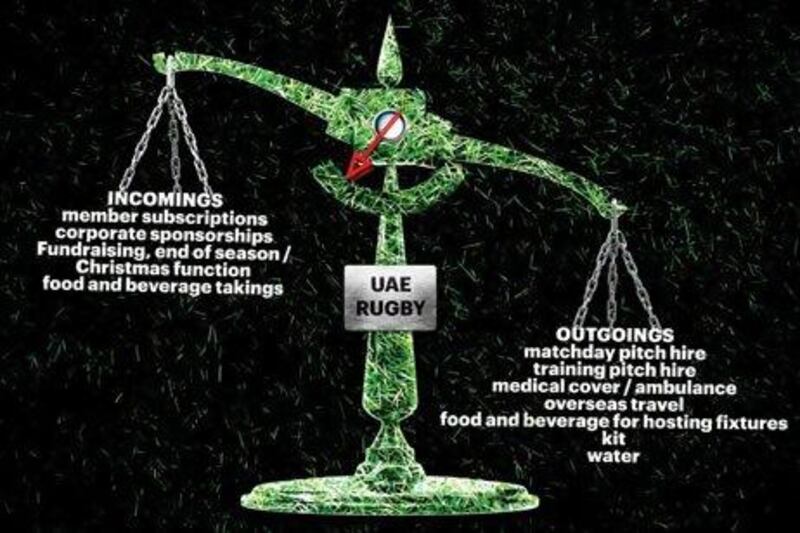A little over three years ago, the representative rugby team for this region beat Hong Kong a nation of fairly comparable size and cultural make up to the UAE in a Test match.
Ever since, meetings between the two sides have provided nothing but pain for the have-a-go heroes from this part of the rugby world.
Thrashing after thrashing has been meted out by an increasingly formidable Hong Kong side, whose star has ascended just as rapidly as the UAE's plummeted.
From next season, as a result of the UAE's demotion from the top tier of Asian rugby, they will not even play each other, such has been the fall.
So what went wrong? One reason usually given for Hong Kong's rapid advance is the fact they have semi-professional players who benefit from a thriving domestic league.
The contrast to here is vast. There are plenty of talented rugby players in this country, but the clubs themselves often endure a precarious balancing act just to survive.
Outgoings that are unique to this part of the world, such as the cost of regular overseas travel to away fixtures or expensive pitch rental in a country where grass does not grow naturally, are rarely offset by the usual methods that exist elsewhere in the world.
For example, many sports clubs the world over recoup at least some of their finances through food and beverage takings at their own clubhouses.
Conversely, all the leading clubs here are tenants. As such, if they are to make a profit on post-match drinks, they would need to make a mark up on top of what the landlords charge.
That is, if they even have that option at all most do not.
The current domestic champions, Jebel Ali Dragons, as an example, have the option of charging extra on drinks at their home at the Centre of Excellence to try to add something to the spartan coffers.
They choose not to, though. In their view, keeping costs lower means more people will opt to stick around, rather than head straight down the road to Barasti without buying a drink. Thus, the social atmosphere of the club benefits.
Yet they profit in other ways. The team's landlords, Jebel Ali Golf Resort & Spa, are happy with the regular Friday afternoon income. As a result, pitch hire comes at a highly preferential rate to that offered to less-regular customers.
Domestic rugby has always survived on the philanthropy of rugby-loving sponsors.
The corporate sponsors never see any real commercial value for any financial outlay they make but their social responsibility and the feeling they are doing something good for their club is enough justification.
The deal penned this week between Dubai Wasps, who have given up naming rights to their sponsors, Xodus Group, is a first for this area. It will allow one of the country's youngest clubs the use of some of the best facilities, as well as paid professional coaching.
Not that sponsorship always means financing. Shoestring budgets have always invoked an entrepreneurial spirit in this part of the world.
In the 1990s, Abu Dhabi Harlequins used to travel to away matches elsewhere in the Gulf in a light aircraft borrowed from one of the players' companies.
If the team travelled with more than the bare first team of 15 players, they would have to leave behind the life raft to make room for the extra players.
The idea of leaning on companies for assistance other than financing persists. The Dragons, for example, borrowed a bus usually used for transporting labourers from the company of one of the players for travel to some away games. Every little bit helps. But is it really going to make much difference in the overall effort to recover the lost ground on Hong Kong?
What needs to happen within the domestic game for the gap to close? If the clubs are "not mature" enough to cope with a semi-professional structure, as one UAE Rugby Federation administrator said recently, then is there any chance of progress?
Some clubs feel they could be in a position to pay players already, but are wary of the impact genuine semi-professional status could have.
If the new Fijian coach, who will be unveiled at a press conference in Dubai today, is seriously going to advance the national team, it will only be with the help of the domestic game.
Follow us
[ @SprtNationalUAE ]






